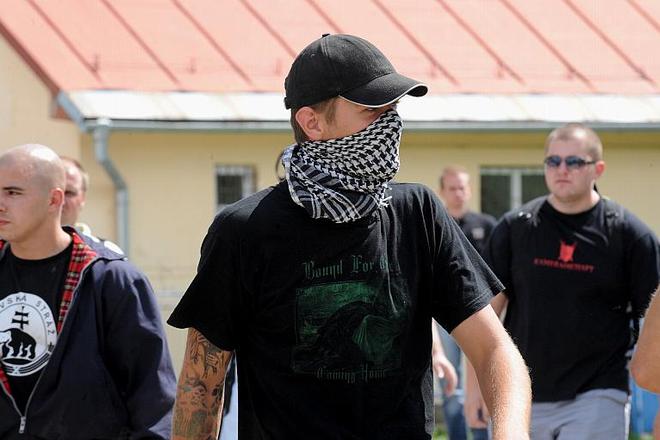IN THE MIDST of growing anti-Roma sentiment across central and eastern Europe, with Slovak neo-Nazi groups organising rallies against what they call Roma crime and a police state, and with some politicians resorting to populist but dangerous solutions to the problem of deprived minorities, the subject of extremism has recently emerged at the centre of public discourse.
While there is an intense search for the most effective ways for governments to respond to the activities of neo-Nazi and extremist groups, US Embassy Charge d'Affaires Keith Eddins said that there is no “one size fits all” response to this challenge, but that the problem has at least two facets that can be addressed anywhere.
“Firstly, it requires a sophisticated approach by law enforcement,” Eddins told a seminar on fighting terrorism and extremism in central and eastern Europe. “In many cases, extremist groups, or individuals within the groups, engage in criminal activities that can and should simply be treated as such. But these groups often receive outside financial support that must be addressed: sometimes under existing laws, sometimes requiring new laws.”
Secondly, society at large needs to examine the social and economic factors that create the conditions which breed membership in these groups, he added. There is a need to fight extremism since, as a rule, every terrorist has first been an extremist, Interior Minister Robert Kaliňák told the seminar, which was organised by the ministry and the US Embassy to Slovakia.
According to Kaliňák, information on terrorism should be exchanged between experts as quickly as possible since terrorism is the biggest security threat today, and is problematic because it has no specific targets, the TASR newswire reported.
As for the outcome of the seminar, the organisers said that that the exchange of information and networking were important.
“The exchange of ideas between the participants is important, but equally useful is these officials - from nine different countries - getting to know one another,” said Eddins. “Personal contacts made at seminars such as these often pay huge dividends in the future, when they may find themselves working together on cross-border cases.”
According to Eddins, the relevance of this particular seminar is in the diversity of the participants – including American organisers and facilitators, plus representatives from nine European countries: Austria, Bulgaria, the Czech Republic, Moldova, Poland, Romania, Slovakia, Slovenia, and Ukraine. The participants represented various agencies ranging from security services to the police, border security agencies, prosecutors and military personnel, Eddins added.
“This broad range of representation illustrates the kind of multi-layered integration among allies that we hope to achieve in our counter-terrorism efforts,” Eddins said. “Many of the techniques and procedures under discussion have a broader applicability to addressing organised crime, corruption, and other criminal activities.”
As for the embassy’s reasons for undersigning the conference, Eddins said that the USA works closely with Slovakia, and all the other nations attending, to meet common threats and common challenges.
“This seminar allowed all of us to exchange ideas and 'best practices' for addressing those threats, whether they be from terror groups, extremists, or organised crime,” Eddins said. “The Slovak police recognise that this is an international issue and were willing to host the conference, not just as a favour to us but as a means of working ever more closely with their neighbours.”
The Roma community has now become a frequent and central target of neo-Nazi groups with, in some cases, locals rendering support and sympathy for the extremist groups. Such developments have prompted a massive debate in the media on approaches that might inspire some reconciliation between Roma and non-Roma.
“I don't claim to be an expert on Roma issues or Roma culture per se, but in general the solution for minority issues has to start with respect,” Eddins told The Slovak Spectator. “Respect for different cultures, respect for individuals, respect for other people’s beliefs and way of life, however different from your own, and a recognition that stereotypes are simply devices for saving a biased person the trouble of learning. Specifically, here in Slovakia, I really believe the key is integration. ‘Separate but equal’ simply doesn't work.”



 Extremist groups in Slovakia are becoming more visible. (source: TASR)
Extremist groups in Slovakia are becoming more visible. (source: TASR)